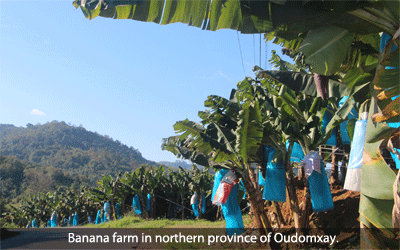Laos: Banana exports drop after govt tightens regulations on growers
The export value of bananas in the first six months (Q1 and Q2) of this year decreased compared to the same period last year and is expected to decline further.
The drop in exports comes after the government called a halt to the establishment of large scale banana plantations in a bid to prevent environmental impacts, with local authorities also taking stricter action against banana farms. Laos earned almost US$125 million from banana exports in Q1 and Q2 this year, while last year’s figure for the same period was over US$137.5 million, according to the Ministry of Industry and Commerce.
The ministry noted that over the past four years, the value of banana exports increased from US$61.5 million in 2013 to US$197.8 million last year.
The main markets for Lao bananas are China and Thailand. Exports to China have increased dramatically, resulting in a change in market structure from a Thailand-oriented export market in the past to a China-dominated export market at present.
Exports from northern Laos to China increased from 42 percent of total banana exports in 2011-12 to 88 percent in 2014-15, the National Agriculture and Forestry Research Institute (NAFRI) reported.
Following the government’s new controls, many companies have now abandoned their plantations and destroyed their banana trees, while some are waiting until the end of their contract with farmers.
The government is also taking tougher action to regulate manufacturing plants and those that were responsible for high levels of pollution have been ordered to shut down.
Some of them failed to comply with the requirements stated in signed agreements and have breached regulations on the import and employment of labour, imported and used controlled chemical substances, and damaged the environment by littering their areas with plastic bags and foams, causing air and water pollution.
This has affected nearby communities and has drawn strong criticism from local people, according to provincial authorities.
Although the economic benefits of banana production are substantial, they are unevenly distributed according to preliminary research findings undertaken by NAFRI in 2016 on the commercial production of bananas.
Banana plantations are a good strategy in theory and have the potential to generate income for people in rural areas, but if not properly controlled they can adversely affect farmers’ health and soil quality. Commercial production in Laos is generally carried out under the 2+3 model with agreements drawn up between farmers and the investor.
The agreement specifies that farmers contribute their labour and land, while the investor provides seeds and a market for the crop, as well as advising on production techniques.
Source: http://www.vientianetimes.org.la/FreeContent/FreeConten_Banana.htm


 Thailand
Thailand




